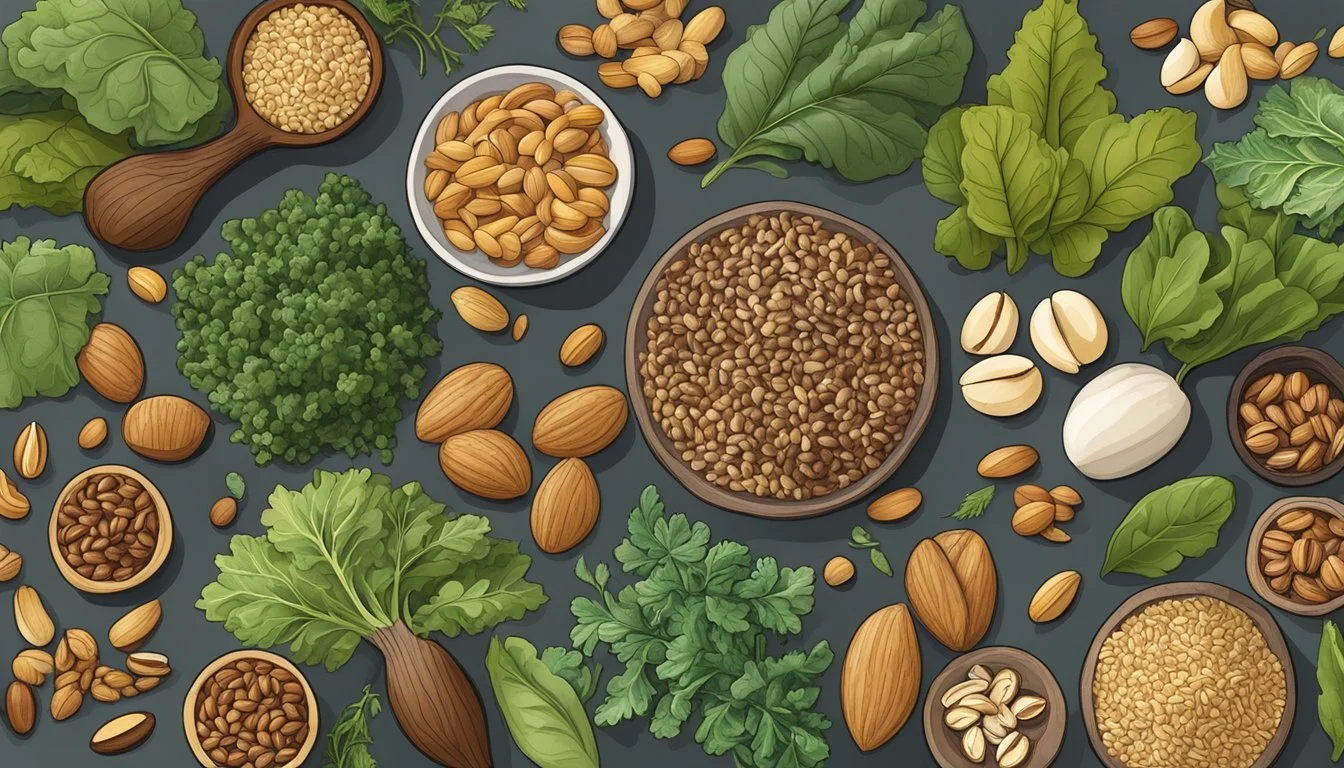10 Foods Rich in Manganese
Essential Nutrients and Health Benefits
Manganese is a trace mineral crucial for various bodily functions, including enzyme activation, bone health, wound healing, and immune system support. This essential nutrient is found in a wide range of foods, making it accessible for most people through a balanced diet.
Why is manganese so important for overall health? Incorporating foods high in manganese into your meals can help ensure adequate intake, supporting key physiological processes and contributing to overall well-being. This article explores the diverse sources of manganese in everyday foods, highlighting the many options available to meet your nutritional needs.
1) Pumpkin Seeds
Pumpkin seeds are a potent source of several essential nutrients, including manganese. Each serving offers a significant contribution to the recommended daily intake of this vital mineral.
A 100-gram serving of pumpkin seeds contains approximately 4,543 mg of manganese, which is about 198% of the daily-recommended intake.
In addition to manganese, pumpkin seeds are rich in other minerals such as magnesium, iron, and zinc. They also provide a good amount of antioxidants, contributing to overall health benefits.
These seeds are versatile and can be added to various dishes, including salads, yogurts, and baked goods, making them easy to incorporate into a balanced diet.
2) Brown Rice
Brown rice is a nutritious whole grain that is particularly high in manganese. This grain retains its bran and germ layers, which contribute to its higher essential nutrient content compared to white rice.
A cooked cup of brown rice, approximately 202 grams, offers about 1.97 milligrams of manganese. This amount provides nearly 86% of the daily value needed for this important mineral.
Manganese plays a significant role in bone formation, blood clotting, and reducing inflammation. Including brown rice in the diet can be an effective way to ensure adequate intake of this essential nutrient.
In addition to manganese, brown rice is rich in fiber, which supports digestive health and helps maintain blood sugar levels. This makes it a beneficial food for those managing blood sugar-related conditions.
3) Pine Nuts
Pine nuts are a rich source of several essential nutrients, including manganese. Manganese is crucial for bone development, metabolism, and antioxidant functions. A single ounce of pine nuts provides a notable 2.5 milligrams of manganese.
Pine nuts also offer other important minerals such as magnesium, iron, and zinc. These micronutrients contribute to various bodily functions, promoting overall health.
In addition to minerals, pine nuts contain vitamins E and K, which are vital for skin health and blood coagulation. They also have a good amount of B vitamins, including B1 (thiamin) and B3 (niacin), which help convert food into energy.
The fats in pine nuts are predominantly unsaturated, making them a healthy option for heart health. They also contain fiber and protein, which can help keep you feeling full and satisfied, aiding in weight management.
Despite their small size, pine nuts pack a significant nutritional punch and are a valuable addition to a balanced, nutritious diet.
4) Spinach
Spinach is a nutrient-dense leafy green that stands out for its impressive manganese content.
A half-cup of cooked spinach provides approximately 0.8 milligrams of manganese, covering about 35% of the daily requirement for an average adult. Spinach is also rich in other essential nutrients, including vitamin A and fiber.
Cooking spinach reduces its volume significantly, making it easier to consume larger quantities and, consequently, obtain more manganese in one's diet. Additionally, spinach is versatile and can be incorporated into various dishes such as salads, soups, and smoothies.
This leafy green not only adds a nutritional boost but also enhances the flavor and texture of many meals.
5) Garbanzo Beans
Garbanzo beans, also known as chickpeas, are a nutritious ingredient that excels in providing manganese. Just half a cup of cooked chickpeas offers approximately 37% of the daily value for this essential mineral, which is vital for bone development and metabolic processes.
These legumes are versatile and can enhance numerous dishes, from salads to stews. They are also a primary ingredient in hummus, a popular dip. Besides manganese, garbanzo beans provide a substantial amount of protein and fiber, contributing to overall digestive health.
Regular consumption of garbanzo beans supports a balanced diet. They are particularly beneficial for vegetarians and vegans due to their high nutrient content. Easily incorporated into various cuisines, garbanzo beans are an excellent choice for those looking to boost their manganese intake naturally.
6) Black Turtle Beans
Black turtle beans are a notable source of manganese, providing both nutritional value and versatility in cooking. These beans contain 0.35 grams of fats, 8.18 grams of high-quality proteins, and 24.4 grams of carbohydrates per serving.
Rich in vital vitamins and minerals, black turtle beans offer a significant amount of vitamin B1, folate, copper, iron, magnesium, manganese, phosphorus, and potassium. These nutrients contribute to numerous health benefits, such as supporting collagen production and regulating carbohydrate metabolism.
One serving of black turtle beans can meet half of the daily protein needs and all the necessary folate and copper. Additionally, their high insoluble fiber content promotes digestive health.
Incorporating black turtle beans into meals is straightforward due to their mild flavor and ease of preparation. They can be used in a variety of dishes, from soups and salads to main courses and side dishes.
7) Whole Wheat Bread
Whole wheat bread stands out as a reliable source of manganese. One slice typically offers about 0.7 milligrams of this essential mineral. Consuming two slices in a sandwich can contribute significantly to daily manganese intake.
Choosing whole wheat over white bread provides additional nutrients like fiber and B vitamins. These benefits complement the manganese content, supporting overall health.
Whole wheat bread is versatile, fitting into various meals from breakfast to dinner. Whether toasted, used in sandwiches, or as a side, it contributes to a well-rounded diet.
Incorporating whole wheat bread into regular meals is both practical and beneficial. It's an uncomplicated way to boost manganese intake without altering eating habits significantly.
8) Chia Seeds
Chia seeds are a nutrient-rich food, well-regarded for their high manganese content. Each serving offers a substantial amount of manganese, a mineral vital for bone health and metabolic function.
These small seeds also contain significant levels of dietary fiber, protein, and healthy fats. They fit easily into various diets, whether sprinkled on salads, mixed into smoothies, or incorporated into baking recipes.
In addition to manganese, chia seeds are a good source of other minerals such as copper, iron, phosphorus, and zinc. This diverse nutrient profile contributes to their popularity as a superfood.
Chia seeds are also notable for their versatility in the kitchen. Their ability to absorb liquid makes them an excellent binding agent in recipes, providing a nutrient boost without altering flavors significantly.
9) Oysters
Oysters are an excellent source of manganese, a critical mineral for metabolic and antioxidant functions. Per 3-ounce serving, oysters provide a significant amount of this nutrient, contributing to daily manganese requirements.
In addition to manganese, oysters are known for their rich mineral content, including selenium, zinc, and copper. These elements are essential for maintaining a healthy immune system and supporting overall cellular functions.
Oysters also offer substantial protein and low caloric content, making them a nutritious option for many diets. They are low in fat but rich in omega-3 fatty acids, which support cardiovascular health by lowering triglycerides and improving HDL cholesterol levels.
The potassium and magnesium in oysters help regulate blood pressure and promote cardiovascular health by relaxing arterial walls, helping prevent hypertension. Moreover, these minerals contribute to muscle function and nerve health.
10) Hazelnuts
Hazelnuts are a rich source of manganese, making them a valuable addition to any diet. A single serving of hazelnuts, approximately 1.5 ounces, provides 1.8 mg of manganese, which is around 76% of the daily value.
Apart from manganese, hazelnuts offer other nutritional benefits. They contain significant amounts of healthy fats, protein, fiber, magnesium, and vitamin E. These nutrients contribute to overall health and wellness.
Regular consumption of hazelnuts may help reduce the risk of cardiovascular disease. They also provide folate, important for heart health and preventing neural tube defects during pregnancy.
Hazelnuts can be easily incorporated into various meals and snacks. They add a delicious crunch to salads, baked goods, and yogurt.
Health Benefits of Manganese
Manganese plays a critical role in supporting bone health and development. It also aids in the proper functioning of metabolic processes.
Bone Health and Development
Manganese is vital for bone development and maintenance. It helps in the formation of bone cartilage and strengthens bones by supporting the synthesis of essential enzymes.
Combined with other nutrients like calcium, magnesium, and vitamin D, manganese contributes significantly to bone density and structure. It has been shown to reduce the risk of bone-related conditions such as osteoporosis and fractures.
The mineral promotes the formation of connective tissues, which are essential for bone health. This makes manganese a crucial nutrient for growth and repair processes in the skeletal system.
Metabolism Support
Manganese is a cofactor for various enzymes involved in metabolic processes. It aids in the metabolism of amino acids, cholesterol, and carbohydrates, ensuring efficient energy production and utilization.
The mineral supports the production of antioxidant enzymes like superoxide dismutase (SOD), which helps protect cells from oxidative stress. This antioxidant function minimizes cellular damage and contributes to overall metabolic health.
Manganese also plays a role in glucose metabolism, helping to regulate blood sugar levels. By facilitating the proper function of metabolic enzymes, manganese ensures that the body can efficiently convert nutrients into energy.
Roles of Manganese in the Body
Manganese plays several critical roles in maintaining overall health, particularly by supporting antioxidant activity and proper nervous system function.
Antioxidant Function
Manganese is a crucial component of the enzyme manganese superoxide dismutase (MnSOD). This enzyme acts as an antioxidant, protecting the body from damaging free radicals.
Free radicals can cause oxidative stress, which may lead to chronic diseases, including cardiovascular disease and certain cancers.
MnSOD helps neutralize these free radicals, thereby reducing oxidative damage.
This antioxidant function is essential for maintaining cellular integrity and preventing inflammation.
Adequate manganese intake supports this enzyme's activity, promoting overall cell health and longevity.
Nervous System Health
Manganese is vital for the synthesis of neurotransmitters, which are chemicals that transmit signals in the brain.
Neurotransmitter synthesis involves enzymes for which manganese is a necessary cofactor.
Without sufficient manganese, the production and function of neurotransmitters such as dopamine and serotonin could be impaired, leading to potential mood disorders or cognitive issues.
Additionally, manganese supports the metabolism of amino acids, glucose, and cholesterol, which are crucial for brain development and function.
Maintaining adequate levels of this mineral is important for both neurodevelopment and ongoing neurological health.
Symptoms of Manganese Deficiency
Manganese deficiency is rare but can lead to several health issues. Specific symptoms of deficiency include:
Individuals with manganese deficiency might experience poor bone growth or skeletal abnormalities. This can manifest as weak bones or deformities in the structure.
Slow or impaired growth is another symptom, particularly noticeable in children and adolescents. This can be due to the role manganese plays in bone development and metabolism.
Low fertility can also result from insufficient manganese. This mineral impacts reproductive health and hormone regulation.
Some may notice impaired glucose tolerance, making it challenging to manage blood sugar levels. This is due to manganese's involvement in carbohydrate metabolism.
In certain severe cases, rare genetic mutations affecting manganese transport can lead to more acute symptoms, such as severe developmental delays, short stature, and seizures.
Symptoms Summary
Poor bone growth or skeletal defects
Slow or impaired growth
Low fertility
Impaired glucose tolerance
Severe developmental delays (in rare genetic cases)
Seizures (in rare genetic cases)
Addressing manganese deficiency involves dietary adjustments or supplementation to ensure adequate intake of this essential trace element. Foods like whole grains, legumes, nuts, and leafy green vegetables are excellent sources.




